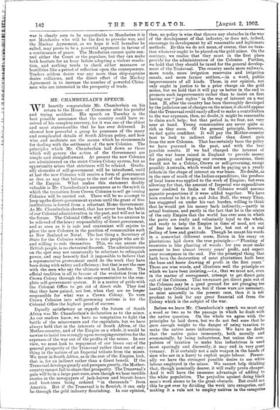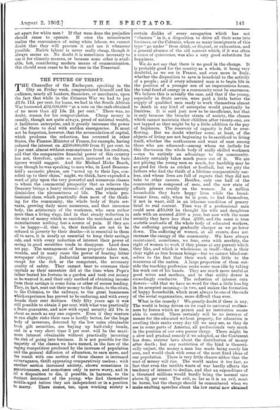MR. CHAMBERLAIN'S SPEECH.
WE heartily congratulate Mr. Chamberlain on his return to the House of Commons after his painful and trying accident. His speech on Tuesday is the best possible assurance that the country could have re- ceived of his complete recovery, for it was one of the ablest and most statesmanlike that he has ever delivered. It showed how powerful a grasp he possesses of the many and complicated details of South African policy, and how wise and moderate are the means which he recommends for dealing with the settlement of the new Colonies. The principles which Mr. Chamberlain laid down as those which will govern the action of the Government are simple and straightforward. At present the new Colonies are administered on the strict Crown Colony system, but as opportunity arises that strictness will be relaxed. Gradu- ally elements of self-government will be introduced, until at last the new Colonies will receive a form of government as free as any that belongs to the rest of the free nations of the Empire. What makes this statement doubly valuable is Mr. Chamberlain's assurances as to the spirit in which the transition from Crown Colonies to self go /erning Colonies will be carried out. There will be no attempt to keep up the direct-government system until the grant of free institutions is forced from a reluctant Home Government. As Mr. Chamberlain showed, that has never been the habit of our Colonial administration in the past, and will not be in the future. The Colonial Office will only be too anxious to be relieved of the heavy responsibility of direct government, and as soon as it is safe and convenient will rejoice to place the new Colonies in the position of communities such as New Zealand or Natal. The last thing a Secretary of State for the Colonies wishes is to rule people who are fit and willing to rule themselves. This, we can assure the British people, is no rhetorical flourish. The administrators on the spot may not unnaturally be reluctant to relinquish power, and may honestly find it impossible to believe that a representative government could do the work they have been doing with safety and efficiency; but that is not the case with the men who say the ultimate word in London. The official tradition is all in favour of the evolution from the Crown Colony through the semi-representative to the com- plete self-government system. It is a matter of pride with the Colonial Office to get rid of direct rule. They feel that they have gained, not lost, when they are no longer responsible for what was a Crown Colony. To turn Crown Colonies into self-governing nations is for the Colonial Office the highest proof of success.
Equally satisfactory as regards the future of South Africa was Mr. Chamberlain's declaration as to the mines. As our readers know, we have no temptation to fight the battle of the mineowners and the capitalists, but we have always held that in the interests of South Africa, of the Mother-country, and of the Empire as a whole, it would be unwise to insist too strongly upon recoupingourselves for the expenses of the war out of the profits of the mines. In our view, we must look to repayment of our losses out of the general prosperity of the Transvaal rather than out of any- thing in the nature of an Imperial tribute from the mines. We must in South Africa, as in the rest of the Empire, look, that is, for an indirect rather than a direct benefit. If the Transvaal develops greatly and prospers greatly, the Mother- country cannot fail to share that prosperity. The Transvaal's gain will be in a large past ours, even though we hear terrible stories in the newspapers of jack-knives and biscuit-boxes and boot-trees being ordered "in thousands" from America. But if the Transvaal is to flourish, it can only be through the gold industry flourishing. In our opinion, then, no policy is wise that throws any obstacles in the way of the development of that industry, or does not, indeed, encourage its development by all reasonable and legitimate methods. By this we do not mean, of course, that no taxa- tion whatever ought to be placed on the gold mines. On the contrary, we realise that they must in the first place provide for the administration of the Colonies. Further, we hold that they should be taxed for the general develop- ment of the Transvaal. The country needs more railways, more roads, more irrigation reservoirs and irrigation canals, and more farmer settlers,—in a word, public improvements of all kinds. These, in our opinion, not only ought in justice to be a prior charge on the gold mines, but we hold that it will pay us better in the end to promote such improvements rather than to insist on first having our "just rights" in the way of interest on a war loan. If, after the country has been thoroughly developed by the judicious use of charges on the mines, it should appear that the Transvaal could easily afford to make a contribution to the war expenses, then, no doubt, it might be reasonable to claim such help ; but that period is, we fear, not very near at hand. Young communities are never quite as rich as they seem. Of the general principle, however, we feel quite confident. It will pay the Mother-country best to look to indirect rather than direct gain from the new Colonies. That has certainly been the policy we have pursued in the past, and with the best possible results. If we had charged the interest of all the war loans raised in England to provide money for gaining and keeping our oversee, possessions, there would not be a Colony, Crown or self-governing, except possibly Australia, which would not be paying us a yearly tribute in the shape of interest on war loans. No doubt, as in the case of much of the Indian expenditure, the produce of local loans was applied to the work of Empire; but even allowing for that, the amount of Imperial war expenditure never credited to India or the Colonies would assume gigantic proportions if it were added together. We have been content to let it go, and John Bull, the weary Titan, has staggered on under his vast burden, willing to think that he would get his money back indirectly,—partly in actual business, and partly in the fact that he is the centre of the only Empire that the world has ever seen in which the parts are really and voluntarily loyal to the whole, and ready to help the Empire in time of need, not out of fear or because it is the law, but out of a real feeling of love and gratitude. Though he meant his words in a somewhat different sense, Bacon in his essay on plantations laid down the true principle :—" Planting of countries is like planting of woods : for you must make account to lose almost twenty years' profit, and expect your recompense in the end. For the principal thing that bath been the destruction of most plantations bath been the base and haste drawing of profit in the first years." Those are wise words, and illustrate well the principle on which we have been insisting,—i.e., that we must not, even in the matter of recoupment, attempt to get direct gain out of the Colonies. That we cannot get direct gain out of the Colonies may be a good ground for not plunging too hastily into Colonial wars, but if those wars are necessary, as most assuredly in the present case, then it is not prudent to look for any great financial aid from the Colony which is the subject of the war.
Before we leave Mr. Chamberlain's speech we must say a word or two as to the passage in which he dealt with the native question. On the whole we agree with the principles he laid down, but we do not feel sure that he gave enough weight to the danger of using taxation to make the native more industrious. We have no doubt that the native gains immensely, both morally and economically, by being industrious, but unless the com- pulsion of taxation to make him industrious is used most sparingly and discreetly, it may end in very great tyranny. It is certainly not a safe weapon in the hands of men who are in a hurry to exploit nearo labour. Person- ally we have the strongest possible desireto see white labour employed in the mines. We cannot help thinking that, though nominally dearer, it will really prove cheaper. And it will have the immense advantage of adding to the white population. The prejudice against doing black men's work seems to be the great obstacle. But could not this be got over by dividing the work into categories, and making it a rule not to employ natives in the categories set apart for white men ? If that were done the prejudice should cease to operate. If once the mineowners realise the convenience of using white labour, we cannot doubt that they will procure it and use it whenever possible. Native labour is never really cheap, though it always seems so. No doubt it is sometimes necessary to use it for climatic reasons, or because none other is avail- able, but, considering modern means of communication, this should soon cease to be the case in the Transvaal.







































 Previous page
Previous page